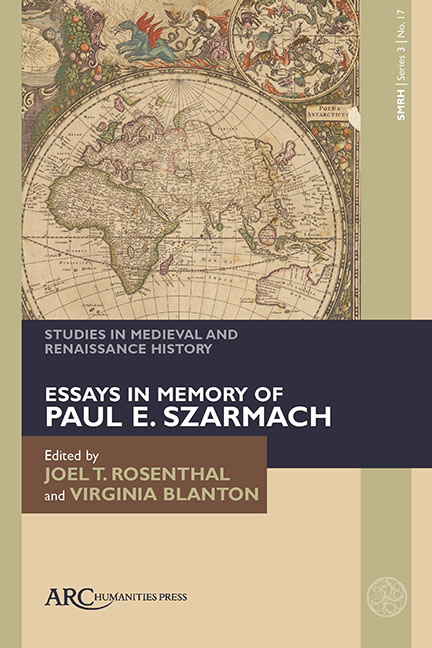Book contents
- Frontmatter
- Contents
- List of Illustrations
- Introduction
- Memories of Viking Age Cultural Contact: England in the Íslendingasögur
- Expressions of Cultural Disability: Navigating (Non)Normativity in the Hebrew–Italian Melekh Artus (King Artus)
- “All the rancour and enmity between us”. The War Between Richard, Earl Marshal, and King Henry III: Its Origins and Resolution
- Royal Consumption and Gifts of Deer in Thirteenth-Century England
- Travers and Trappe in the Palace of Pandarus: A Note
- Benedictine Devotion to England’s Saints: Thomas de la Mare, John of Tynemouth, and the Sanctilogium in Cotton Tiberius E. i
- The Rise of Admission by Apprenticeship Among the Freemen of Norwich, 1365–1415
- Nuns on the Run, or the “Sturdy and Wilful Dames” of Syon Abbey and their Disobedience to the Tudor State ca. 1530–1600
- Taking the Tour: Heritage Management in A Connecticut Yankee in King Arthur’s Court
Benedictine Devotion to England’s Saints: Thomas de la Mare, John of Tynemouth, and the Sanctilogium in Cotton Tiberius E. i
Published online by Cambridge University Press: 13 February 2024
- Frontmatter
- Contents
- List of Illustrations
- Introduction
- Memories of Viking Age Cultural Contact: England in the Íslendingasögur
- Expressions of Cultural Disability: Navigating (Non)Normativity in the Hebrew–Italian Melekh Artus (King Artus)
- “All the rancour and enmity between us”. The War Between Richard, Earl Marshal, and King Henry III: Its Origins and Resolution
- Royal Consumption and Gifts of Deer in Thirteenth-Century England
- Travers and Trappe in the Palace of Pandarus: A Note
- Benedictine Devotion to England’s Saints: Thomas de la Mare, John of Tynemouth, and the Sanctilogium in Cotton Tiberius E. i
- The Rise of Admission by Apprenticeship Among the Freemen of Norwich, 1365–1415
- Nuns on the Run, or the “Sturdy and Wilful Dames” of Syon Abbey and their Disobedience to the Tudor State ca. 1530–1600
- Taking the Tour: Heritage Management in A Connecticut Yankee in King Arthur’s Court
Summary
THE FOLLOWING ARTICLE confirms a suspected provenance for MS Cotton Tiberius E. i and suggests a rationale for its production and use, even as it contributes to scholarship about Anglo-Latin hagiography, monastic history, devotional reading, and the afterlives of medieval manuscripts. I wish to acknowledge here a substantial debt to my mentor and fiercest champion, Paul E. Szarmach, who long ago put before me a Cottonian manuscript containing insular saints—and in doing so changed the pole star by which I have charted my academic career. His last “ask” was for a contribution to this issue of Studies in Medieval and Renaissance History, and while I can never repay him for all he has done, this is a small credit in the account ledger. It is, perhaps, a particularly apropos essay for this memorial volume, as it focuses on an astute and canny administrator and his patronage of a book of prose saints’ lives.
In 1696, William Nicolson, Bishop of Carlisle, printed a manuscript donor inscription that specified Abbot Thomas de la Mare of St. Albans (ca. 1309–1396, abbot 1349–1396) gifted the book to a dependency, Redbourn Priory. From that point forward, the collection of saints’ lives in London, British Library Cotton MS Tiberius E. i, has been assigned to Redbourn, even as the book's association with Abbot Thomas has been endorsed, despite the inscription being lost when the book was damaged in the 1731 Asburnham House fire. Remnants of the book vary from complete leaves with slightly burned edges to brittle fragments. During conservation, each of the relatively intact folios, which shrank and buckled in the heat of the fire, was spliced to allow it to lie flat. Now inlaid on paper mounts and bound in two volumes, these leaves (with a text block of 265 x 175 mm) can again be read, albeit with lacunae. A contemporary index at the opening of the first volume (I.2r–5v) is compromised, but the legibility of the surviving leaves makes it possible to ascertain that the two volumes contain John of Tynemouth's Sanctilogium Angliae, Walliae, Scotiae, et Hiberniae, a compendium of insular saints in calendar order by feast beginning with 5 January (I.6r–13r), the feast of Edward the Confessor, and running through to 30 December, the feast of Egwin. Folio 6r (Figure 6.1) opens the collection and is uniquely ornamented by a large, eight-line puzzle initial and a foliate penwork border.
- Type
- Chapter
- Information
- Studies in Medieval and Renaissance History series 3 volume 17Essays in Memory of Paul E. Szarmach, pp. 105 - 118Publisher: Amsterdam University PressPrint publication year: 2023



